Academic Conversations with ELLs: Series Overview Transcript
Lower Third:
Tch
Teaching Channel
+++ 00:00:03 +++
Student: You want to send it out there.
Student: I feel like I wasn't unorganized because I knew what I was talking about.
Student: They know that they're just naive.
Woman 1: The students want to know how to have conversations. They want to know practical ways to speak to get what they need.
Lower Third:
Academic Conversations
with ELL's:
A Series Overview
+++ 00:00:24 +++
Viet-ly Nguyen: First thing I would like for you to do, turn towards your partner and discuss your answer right now.
Lower Third:
Maria Santos
Co-Chair & Senior Leadership Advisor
Understanding Language Program, Stanford University
+++ 00:00:29 +++
Maria Santos: This series is about academic discussion. It is about teachers trying out a set of strategies to create classrooms where rich academic discussion happens. It's about paying attention to what the other is talking about and then contributing, building on their ideas or agreeing with their idea or disagreeing.
+++ 00:00:56 +++
Viet-ly Nguyen: Take a look at the target for today, please.
Students: I can engage in academic discourse.
Lower Third:
Jeff Zwiers
Senior Researcher
Understanding Language Program, Stanford University
+++ 00:01:04 +++
Jeff Zwiers: This series is about valuing oral language and valuing student communication, particularly student-to-student communication.
Lower Third:
I actively listen to other students.
Tamika Groves: Teelin [ph?]?
Teelin: I actively listen to other speakers.
Tamika Groves: All right. I'm glad you said that. What's--.
+++ 00:01:19 +++
Maria Santos: Every single teacher needs to be thinking about how do I help the English Language Learner in my core academic class gain access to the curriculum, negotiate ideas, make sense, and participate in the discussions of this classroom?
+++ 00:01:37 +++
Tamika Groves: I like that everyone's sharing their idea but make sure like how Michael responded to someone else, I want to hear talkings, too, okay?
Lower Third:
Johanna Paraiso, Socratic Seminar
Tamika Groves, Analyze Non-Fiction Text
Viet-ly Nguyen, Text Analysis thru Student Talk
+++ 00:01:46 +++
Maria Santos: The three teachers have determined, also, specific language development targets, as well as content targets that they have for their classroom, and they're very clear with their students as to what those are.
Lower Third:
Socratic Seminar: Evaluating and Reflecting on the Learning Process
+++ 00:02:03 +++
Maria Santos: Teachers in this series are learning new practices. They're experimenting with new practices. The common core is new. For the district, the focus for the year was on academic discussion, reading complex text, writing, using evidence. The environment within the district was to encourage teachers to experiment, to try, to learn new practices, and to bring those into the classroom.
+++ 00:02:35 +++
Viet-ly Nguyen: You guys have already been doing this a little bit so far. Just going to do now write using evidence and examples.
Lower Third:
Academic Conversations
Classroom Talk That Fosters Critical Thinking
and Content Understandings
Jeff Zwiers &
Marie Crawford
+++ 00:02:39 +++
Jeff Zwiers: I wrote a book called Academic Conversations in which we found the skills that people need to carry on a productive and constructive conversation.
Lower Third:
Creating an idea
Clarifying the idea
paraphrasing / asking for elaboration
Fortifying an idea
supporting with evidence
Negotiating an idea
+++ 00:02:49 +++
Jeff Zwiers: The current skills that we're working on in different classrooms are creating an idea and then clarifying the idea, and that can include paraphrasing and asking for elaboration, and then fortifying an idea, which also includes supporting an idea with evidence, and then, finally, negotiating an idea, which means that if you have another idea, negotiating two ideas. All of those skills focus on building something that wasn't there before.
Lower Third:
Johanna Paraiso
Socratic Seminar: Senior Project Reflection
+++ 00:03:17 +++
Johanna Paraiso: You're going to want to talk about the whole process. That's the goal. But I want you also to talk about your own individual process.
+++ 00:03:24 +++
Jeff Zwiers: In Joanna's class what was exciting was to see the level of engagement of the students. They were talking about some of the scores and evaluations that they had had from their senior project, and they were talking at a high level, and it had been well set up by the teacher.
Student: Because they chose the separate issues, it made it harder for themselves.
+++ 00:03:46 +++
Jeff Zwiers: Her use of video and also transcribing-- even a little bit of transcribing can be a powerful way to both understand how students are thinking and then also to show students some powerful thinking by students and also some next steps.
Student: I think the third trip was important.
+++ 00:04:05 +++
Maria Santos: ELL's need that extra time and extra support to be successful. We also want the ELL's to have practice in environments where they're coached and they're supported and celebrated.
Lower Third:
Tamika Groves
Academic Discussions: Analyzing Nonfiction Text
+++ 00:04:21 +++
Tamika Groves: You guys are still doing excellent job, and I love how we all have our ideas out on our paper.
+++ 00:04:26 +++
Maria Santos: Tamika gives lots of positive reinforcement. Helping kids take risk, she also acknowledges how difficult it is for them and celebrates that.
Student: It's hard to explain my response.
Tamika Groves: Yeah, I'm sure it is.
+++ 00:04:41 +++
Viet-ly Nguyen: I want you to think about who Delphine is as a character.
Lower Third:
Discussion Prompt
Do you think Delphine and her sisters
should return to the Center and/or attend
the Rally for Bobby? Why or why not?
What promises has she made to her father?
What kind of big sister is she?
Lower Third:
Viet-ly Nguyen
Academic Discussions: Deepening Text Analysis
through Student Work
+++ 00:04:45 +++
Jeff Zwiers: In Viet-ly's class, she emphasizes the power of the prompt, and I think that's something that needs to be thought about more. It's not just the first thing that comes to my mind that I think kids might answer. It's not just a question. It's a prompt that you think will garner different perspectives, different, more complex answers, not just one-word answers. Another thing I noticed was the whole group modeling.
Student: When they started going through a city, they started running water through.
+++ 00:05:11 +++
Jeff Zwiers: There was a class discussion, but she was modeling some of the moves and some of the conversation skills as the whole group was talking and sharing.
Student: The debate's whether or not that Delphine and her sister should go.
+++ 00:05:23 +++
Jeff Zwiers: If we don't start in kindergarten, they're going to get behind, and so every year, we need to think about how do we articulate, how do we build their skills for conversing with one another every year in school, both for content purposes for standards purposes, but also for their life purposes.
+++ 00:05:42 +++
Johanna Paraiso: Why do you think I showed you random and anonymous feedback before I give you all of your individual?
+++ 00:05:47 +++
Maria Santos: Children want to learn, and when we design the learning experiences for them to learn, they're with us all the way.
Lower Third:
I can set my goals and reflect on my
Lower Third:
ELD
I can set goals and
reflect on my Academic
Discussion Participation.
"YES!"
+++ 00:05:57 +++
Student: I can set goals and reflect on my acad...
Tamika Groves: Academic.
Student: ... academic discussion participation.
Tamika Groves: One, two, three...
Students: Yes!
+++ 00:06:05 +++
Tamika Groves: Yes!

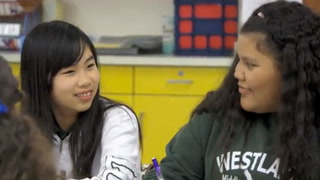
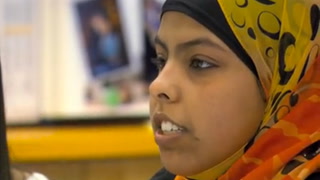
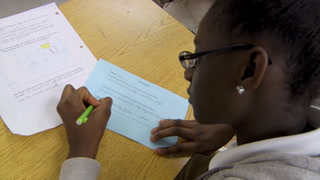
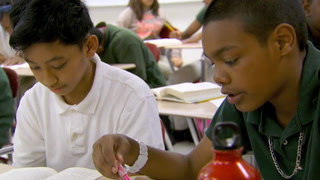
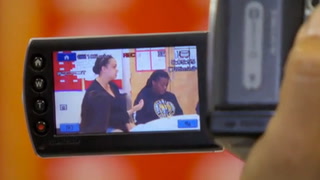
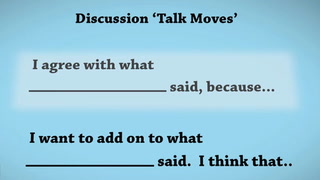
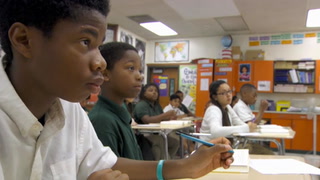









12 Comments
Teresa Monroe Jul 20, 2020 2:32pm
Academic conversations are "talk" about content and instruction as opposed to social conversations which are those that take place outside the learning environment. For example, talk in the cafeteria is usually social; talk about the science experiment is usually academic.
Oral language should be valued because students need to learn to speak in English and be comfortable communicating in English.
It is important to engage students so that they become more comfortable over time speaking and conversing with their peers.
Michael Stires Jun 22, 2020 1:05pm
Talk becomes critical when students discuss tasks or ideas and question one another, negotiate meaning, clarify their own understanding, and make their ideas comprehensible to their partners. It is during collaborative tasks that students must use academic language if they are to focus on the content. Oral language lays the foundation for the reading and writing skills students will develop as they enter and progress through school. Having a solid foundation in oral language will help students become successful readers and strong communicators as well as build their confidence and overall sense of well-being. Engaging students in an academic conversation can be done as a classroom with students talking amongst themselves and the teacher regarding the subject matter that is presented.
Carolyn Thomas Apr 19, 2018 10:25am
Michelle Batista Feb 5, 2018 9:30pm
BELINDA MORENO Mar 31, 2017 12:38pm